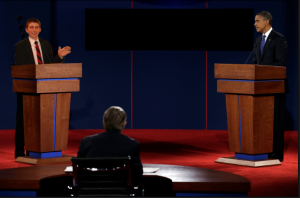 One can do both IEs and Debate at a tournament. It’s best to pick a debate form and stick with it so you can improve over time. In Oregon, there are 4 types of debate. They are:
One can do both IEs and Debate at a tournament. It’s best to pick a debate form and stick with it so you can improve over time. In Oregon, there are 4 types of debate. They are:
- Parliamentary (Parli) Debate
- Policy (Cross-Examination/CX) Debate
- Public Forum (Pofo) Debate
- Lincoln-Douglas (LD) Debate
Below is an overview of each format. For specific rules or more information, contact us or see the links within each description. (At the college level, Parli and Policy are most popular. Most scholarships go to Policy Teams (largely because Parli is not a national event in high school), but it is not uncommon for schools like UC Berkeley to give scholarships for Parli as well).
Prep: You see the resolution 15 minutes before the round and prep your aff/neg case based on what you know. No sources are allowed in prep.
Speaking times:
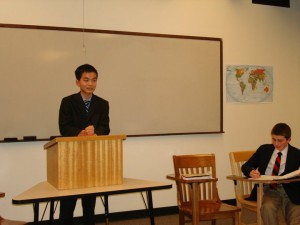
Aff Person A – 7 min.
Neg A – 8 min.
Aff B – 8 min.
Neg B – 8 min.
Neg A – 4 min.
Aff A – 5 min.
Parli is a style best for someone who is interested in/follows current events. While all debate forms can be learned through experience and coaching, if you’re naturally analytical or logical and don’t want to spend time preparing a formal case beforehand (see the other debate formats) Parli is for you. It’s also the main form of collegiate debate. Unfortunately, while immensely popular in OR and CA, it is not yet a national event at the National Forensics League national championship tournament. Regardless, it remains one of the most popular forms of debate in Oregon and thus equally prestigious on the west coast to any other debate form.
Examples: Here. (Note: these are California parli rounds, so the speaking style is often a bit faster, they’re a bit more technical, and the speaking times are slightly different.)
Rules: OSAA Oregon Parliamentary Debate Rules.
Prep: The resolution (topic being debated) remains the same year round. You spend the year continually building and updating both your aff and your neg case with “cards,” or sources.
Speaking times:
Affirmative Person A: 8 min
CX (cross examination questioning time) by a Neg speaker (asking questions to Aff A): 3 min
Neg A: 8 min
CX by an Aff speaker to Neg A: 3 min
Aff B: 8 min
CX by the other Neg speaker (the one who hasn’t asked questions yet) to Aff B: 3 min
Neg B: 8 min
CX by the other Aff speaker to Neg B: 3 min
Neg A: 5 min
Aff A: 5 min
Neg B: 5 min
Aff B: 5 min
As the speaking times probably reveal, CX debate is a bit harder to learn than any of the other forms. It is, however, fairly straightforward after one has done a few rounds. CX debate is best for someone willing to spend all year on one subject, and to put in the time of prep. You talk faster than in all the other debate forms. This form of debate also introduces three new types of arguments that no other type of debate uses, because there are fewer rules and regulations for Policy Debate. Policy debaters are granted the freedom to debate whether or not certain rules should be held in round and how those rules should effect the debate, along with what debate should be as an activity. This is by far the most complex–yet most rewarding–form of debate.
The advantages of doing CX debate are clear: it is national event, meaning that if you do it all year you can get good enough to qualify to nationals; some colleges recruit the top CX debaters; there are often fewer competitors, meaning it is easier to win (if you get good) and easier to qualify to state at the district tournament (for example, in recent years districts was the first tournament for certain CX teams that had done parli all year, and yet, because there were only 3 or 5 competitors–qualifying 2 or 3 teams to state, respectively, since the OSAA recognizes that there are fewer teams and thus makes the qualification-per-teams-entered quota very favorable–both “novice” CX teams made it to state. And, in 2011, one parli-turned-CX-team actually broke to out rounds at state.); and you can run more theory-based arguments. Beyond the fact that it is a nationally recognized event, it is also one of the most rigorous forms of debate, ensuring that all participants who stick with it are sure to learn much about the topic and the technical side of debate.
Example: 2012 NFL Nationals Policy Round beginning (the other parts are also on YouTube) and Resolved.
Oregon Rules: OSAA CX Rules.
Colleges with Policy Debate Scholarship Opportunities:
University of Southern California – Quarter, Half, and Full Ride
Baylor University – Full Ride
Cornell University – Course Credits
Berkeley – Partial
University of Oregon – Several small scholarships w/ larger scholarships for members of the honors college
Whitman – Several for at least $2,500
And many more!
Prep: The topic rotates every month, and you have previously prepared and researched both the aff and neg positions. Current Topic.
Speaking Times:
(Note: Aff doesn’t always speak first. Speaking order and case side are determined by a coin flip).
Team 1 person A: 4 min
Team 2 person A: 4 min
Crossfire (cross-examination period) between 1A and 2A: 3 min
Team 1 person B: 4 min
Team 2 person B: 4 min
Crossfire between 1B and 2B: 3 min
Team 1 person A: 2 min
Team 2 person A: 2 min
Grand Crossfire between all speakers: 3 min
Team 1 person B: 2 min
Team 2 person B: 2 min
Public Forum debate is sort of Parliamentary Debate mashed with Cross Examination debate. Your topic changes, but only once a month. You use logic as well as sources. Public Forum is a national event. A more thorough explanation is found in the rules.
Example: None currently available.
Oregon Rules: OSAA Public Forum Rules.
Prep: The topic changes every 2 months, and you will have a prepared, researched case you’ve created ahead of time. Current topic.
Speaking Times:
Aff: 6 min
Neg cross-examines Aff: 3 min
Neg: 7 min
Aff CXes Neg: 3 min
Aff: 4 min
Neg: 6 min
Aff: 3 min
Lincoln-Douglas is a values debate, in which a debater often shows why something is or isn’t justified, or why one form of moral action (like, say, punishment) should be preferred over another morals-based action (such as rehabilitation). This is the only debate form for 1 person, so if you can’t find or don’t want to trust a partner with your debate record, this is a strong form to choose. It is also not hard to learn, and it is national debate event.
Example: None currently available.
Oregon Rules: OSAA Lincoln-Douglas Rules.
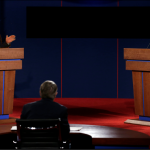
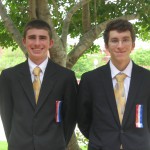
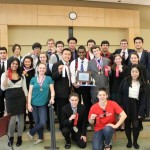
Speak Your Mind